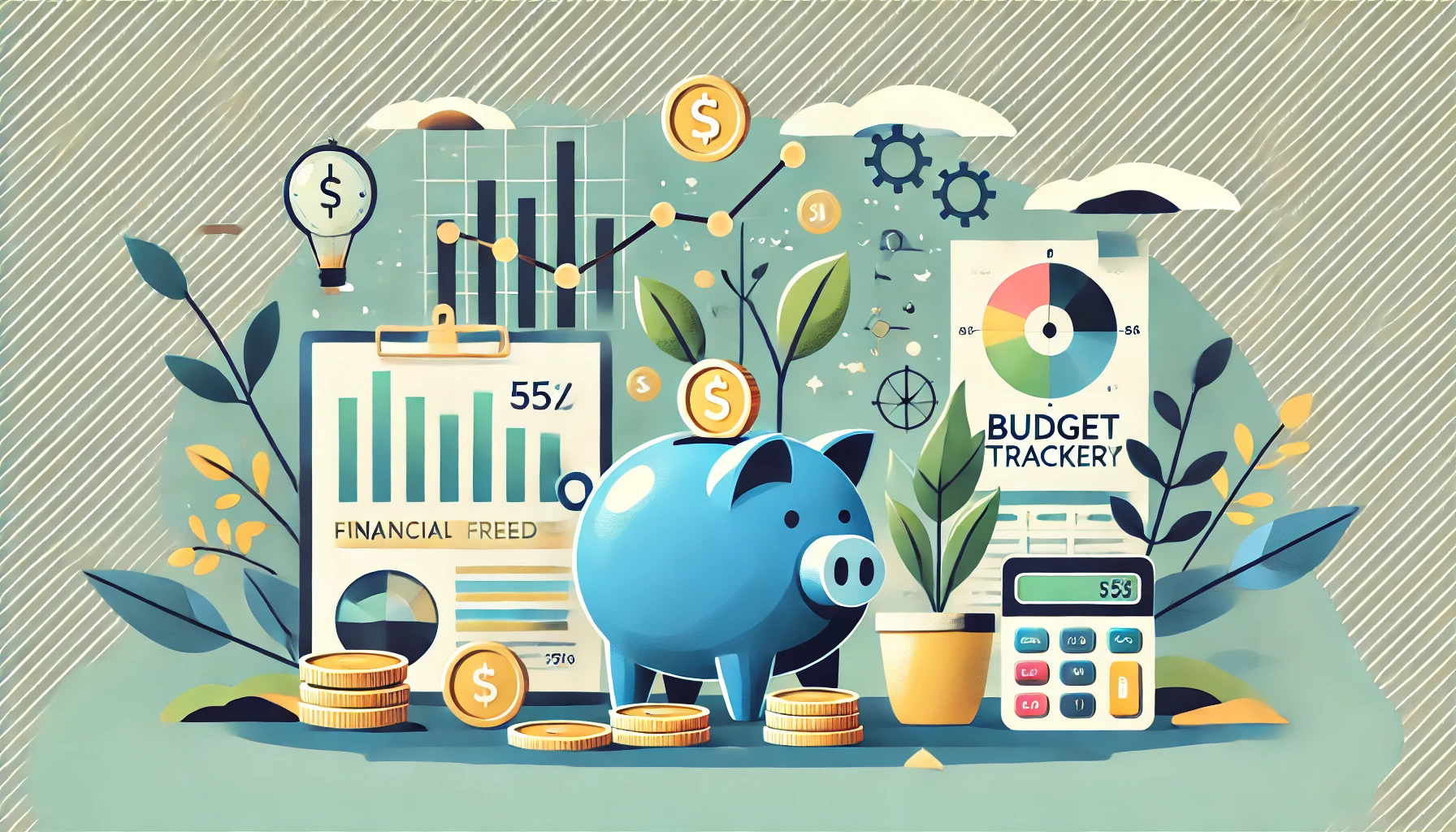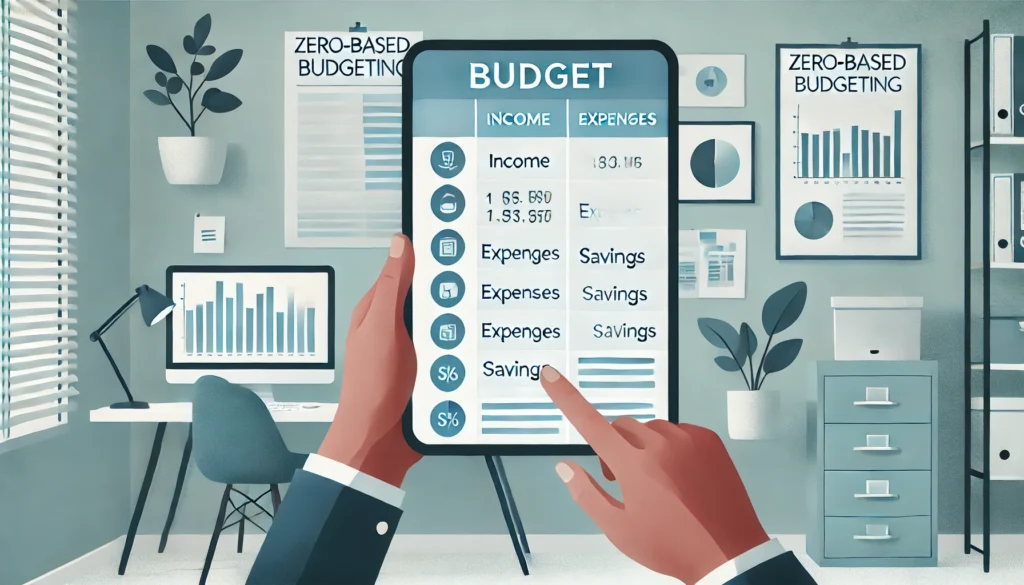
Achieving financial freedom isn’t just about having more money — it’s about gaining control over your finances. Whether you’re managing a household budget or planning for long-term goals, the key is to implement an effective budgeting system. This guide will walk you through popular budgeting methods like Zero-Based Budgeting and the 50/30/20 Budget Rule, helping you manage your income, expenses, and savings with clarity. With tools like the Notion Finance Tracker and YNAB, you can transform your financial habits and set yourself on a path toward financial independence.
Table of Contents
Getting Started with Your Budgeting Journey
Taking control of your finances starts with creating a clear and actionable plan. Budgeting is essential to track spending, prioritize goals, and achieve financial stability. Here’s a step-by-step guide to kick-start your budgeting journey:
- Choose a Budgeting Method: Begin by selecting a method that suits your lifestyle and financial situation. Two popular options are:
- Zero-Based Budgeting: Allocate every dollar of your income to specific categories, leaving no unassigned funds. This helps you stay on top of your expenses and prevents overspending.
- 50/30/20 Budget Rule: Allocate 50% of your income to needs, 30% to wants, and 20% to savings or debt repayment. This simple rule provides flexibility while ensuring a balanced approach to managing your finances.
- Set Financial Goals: Define both short-term and long-term financial goals. These can range from building an emergency fund to saving for retirement. Clear goals give your budget direction and motivation.
- Track Your Income and Expenses: Begin by calculating your total monthly income. Then, list all your fixed and variable expenses, ensuring no detail is left out. Using a budgeting tool like the Notion Finance Tracker or YNAB (You Need a Budget) can simplify this process.
- Monitor and Adjust: Review your budget regularly to ensure it aligns with your financial goals. Life changes, like a new job or unexpected expenses, may require adjustments to stay on track.
By starting your budgeting journey with a clear structure and easy-to-use tools, you’ll develop habits that promote financial freedom. Getting organized and staying consistent are key to turning your financial goals into reality.

What is Zero-Based Budgeting?
Zero-Based Budgeting (ZBB) is a budgeting method where every dollar of your income is assigned a purpose. Instead of basing your budget on past expenses, you start from scratch each month, ensuring that your income equals your expenses. The goal is to give every dollar a job, whether it’s for savings, debt repayment, or daily expenses.
By allocating every dollar, ZBB helps you become more mindful of your spending habits and ensures you’re using your money intentionally. This method encourages a clearer financial picture, making it easier to control spending and achieve your financial goals.
Tools like YNAB (You Need A Budget) make it simpler to implement ZBB by tracking your expenses and guiding you through the process of planning and categorizing your finances.
How to Get Started with Zero-Based Budgeting
Zero-based budgeting is a powerful method to gain control over your finances by assigning every dollar a job. This approach is a practical way to prevent overspending and ensure that each dollar of your income has a purpose. Here’s how to get started:
- Calculate Your Monthly Income: Start by determining your total monthly income after taxes. This includes wages, side income, freelance work, or any other sources of income.
- List Your Expenses: Write down all your monthly expenses. This includes both fixed costs like rent and utilities, as well as variable costs such as groceries, transportation, and entertainment.
- Allocate Every Dollar: The key principle of zero-based budgeting is to ensure that every dollar has a specific purpose. Start by assigning amounts to your fixed and necessary expenses, then move on to variable spending categories, savings, and debt repayment.
- Adjust as Needed: Since income and expenses can fluctuate, it’s essential to adjust your budget regularly. If unexpected costs arise, reallocate funds from other categories to maintain a balanced budget.
- Track Your Progress: Use tools like the Notion Finance Tracker or YNAB (You Need a Budget) to keep a close eye on your spending. These platforms allow you to monitor your finances in real-time, making it easier to stay on track and make adjustments when necessary.
Zero-based budgeting is an effective way to ensure that your money is being used wisely, allowing you to avoid unnecessary spending and focus on reaching your financial goals. This method encourages proactive financial management, setting you on the path to financial freedom.

Understanding the 50/30/20 Budget Rule
The 50/30/20 Budget Rule is a popular and straightforward budgeting method that divides your after-tax income into three main categories:
- 50% for Needs: This portion covers essential expenses like rent, utilities, groceries, transportation, and insurance. These are non-negotiable expenses that you must pay to live comfortably.
- 30% for Wants: This category allows for discretionary spending, such as dining out, entertainment, and hobbies. It gives you the freedom to enjoy life without overindulging.
- 20% for Savings and Debt Repayment: The final 20% is dedicated to building savings, retirement funds, or paying off debt. This helps ensure long-term financial security and progress towards financial freedom.
The simplicity of the 50/30/20 Budget Rule makes it a great starting point for those new to budgeting. It allows for flexibility while still promoting a balanced approach to managing both essential expenses and long-term financial goals. Tools like YNAB (You Need A Budget) or a Finance Tracker can help you automate and track these categories, making it easier to stick to the plan.
Why You Need a Budget (YNAB)
Budgeting is crucial for maintaining financial control, and using the right tools can make the process even more efficient. One of the most popular budgeting systems is You Need a Budget (YNAB), a comprehensive tool designed to help users manage their finances with clarity and purpose.
YNAB is built around four simple rules:
- Give Every Dollar a Job: Much like Zero-Based Budgeting, this rule encourages you to assign every dollar of your income to a specific category. Whether it’s for bills, savings, or discretionary spending, this method ensures your money is always working for you.
- Embrace Your True Expenses: YNAB helps you plan for irregular or non-monthly expenses (like car repairs, insurance premiums, or holiday shopping) by breaking them down into manageable monthly amounts. This avoids the financial shock of large, unexpected expenses.
- Roll with the Punches: Life is unpredictable, and so are our financial needs. YNAB’s flexibility allows you to adjust your budget as situations change. If you overspend in one category, simply reallocate funds from another.
- Age Your Money: The goal of YNAB is to help you reach the point where you’re spending money that you earned at least 30 days ago. This creates a buffer, reducing financial stress and building long-term stability.
Why Use YNAB?
- Enhanced Financial Awareness: YNAB helps you stay aware of where every dollar is going, reducing impulse spending and promoting financial discipline.
- Long-Term Planning: By breaking down large expenses into smaller, manageable portions, YNAB helps you prepare for the future and avoid financial surprises.
- Customizable and User-Friendly: The platform is intuitive, making it easy to tailor your budget to your specific needs and preferences.
Integrating YNAB with a tool like the Notion Finance Tracker can give you a powerful combo to not only stay on top of your budget but also track detailed financial goals and daily spending habits. Whether you’re saving for a major life event or just trying to maintain financial stability, You Need a Budget (YNAB) is a powerful ally in your journey toward financial freedom.

The Benefits of Budgeting: Financial Freedom Awaits
Budgeting is more than just tracking expenses — it’s a powerful tool that leads to financial freedom and peace of mind. By consciously managing your money, you not only control your spending but also make strides toward achieving your long-term financial goals. Here are some key benefits of budgeting and how it contributes to financial freedom:
- Clarity and Control Over Finances
Budgeting gives you a clear understanding of where your money is going each month. With a solid budget in place, you can see exactly how much you’re spending on essentials, discretionary items, and savings. This clarity helps prevent overspending and ensures that your financial priorities are always front and center. - Reduced Financial Stress
When you know your expenses are covered and you’re saving for future goals, it removes the anxiety often tied to money. A well-structured budget ensures that every dollar has a purpose, giving you peace of mind that you’re on track, even when unexpected expenses arise. - Achieving Long-Term Goals
Whether you’re saving for a down payment on a house, planning for retirement, or building an emergency fund, budgeting helps you allocate funds toward these important goals. By breaking them down into smaller, manageable amounts, you’ll steadily work toward achieving milestones that bring long-term security. - Improved Spending Habits
Tracking your expenses through a budget makes you more aware of your financial choices. Over time, you may notice patterns in spending that you can adjust — such as cutting down on unnecessary purchases — which can lead to better financial habits and increased savings. - Financial Flexibility and Preparedness
A budget also prepares you for life’s unexpected moments. With emergency savings built into your budget, you can handle surprise expenses without the need to rely on credit cards or loans. This flexibility not only saves you from debt but also strengthens your overall financial resilience. - Pathway to Financial Freedom
Ultimately, budgeting is your roadmap to financial freedom. By consciously directing your money where it’s needed most, you build wealth over time and reduce the burden of debt. This freedom allows you to focus on bigger life goals, travel, or pursue passions without the stress of financial limitations.
To truly take control of your finances and experience these benefits, the right tools are essential. The Notion Finance Tracker makes this process easier by organizing your accounts, expenses, and income in one place. This combination of budgeting and digital efficiency will help you build a healthier relationship with money and move closer to your goals of financial independence.
Conclusion: Take Control of Your Finances Today
Achieving financial freedom starts with taking control of your money, and the first step in that journey is building a budget. Whether you choose to implement strategies like Zero-Based Budgeting or the 50-30-20 Budget Rule, the key is consistency and awareness. A budget provides clarity, reduces financial stress, and keeps you on track toward your long-term financial goals.
By staying organized and prioritizing your financial well-being, you empower yourself to make smarter decisions, spend within your means, and build a future without the constant worry of money. Tools like the Notion Finance Tracker are invaluable in this process, streamlining your budgeting efforts and giving you a simple, efficient way to stay on top of your expenses, income, and goals.
Now is the time to take control of your financial journey. With careful planning and the right tools, you can enjoy the peace of mind and flexibility that come with financial independence.

